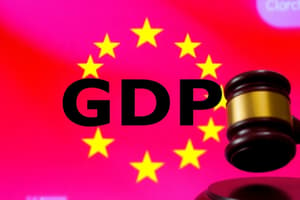Podcast
Questions and Answers
A multinational corporation headquartered outside the EU processes personal data of EU residents. Under what conditions does GDPR apply to this corporation?
A multinational corporation headquartered outside the EU processes personal data of EU residents. Under what conditions does GDPR apply to this corporation?
- GDPR applies only if the corporation has a physical office within the EU.
- GDPR never applies to organizations outside the EU, regardless of the data they process.
- GDPR applies only if the corporation voluntarily complies with GDPR standards.
- GDPR applies only if the data processing is directly related to offering goods or services to EU residents, or monitoring their behavior within the EU. (correct)
A data controller relies on 'legitimate interest' as the justification for processing personal data. Which of the following scenarios would most likely be considered an invalid application of 'legitimate interest' under GDPR?
A data controller relies on 'legitimate interest' as the justification for processing personal data. Which of the following scenarios would most likely be considered an invalid application of 'legitimate interest' under GDPR?
- Processing customer data to prevent fraud and ensure network security, where the benefits are balanced against the individual's privacy expectations.
- Processing personal data for direct marketing purposes without providing individuals an easy and consistent opt-out mechanism. (correct)
- Processing employee data for payroll and human resources management purposes, as required by local labor laws.
- Processing data to comply with a legal obligation to which the controller is subject.
A data breach occurs at a company that processes personal data on behalf of a controller. Under GDPR, what are the potential liabilities and obligations of the data processor?
A data breach occurs at a company that processes personal data on behalf of a controller. Under GDPR, what are the potential liabilities and obligations of the data processor?
- The data processor is only liable if the data processing agreement explicitly states so; otherwise, the controller bears full responsibility.
- The data processor's liability is limited to the fees paid by the data controller under their contract.
- The data processor is jointly and severally liable with the controller, and they must notify the controller without undue delay after becoming aware of a data breach. (correct)
- The data processor has no direct liability to data subjects; only the data controller can be held liable.
A company intends to collect and process biometric data (facial recognition) of its employees for security purposes. Which of the following conditions would be considered a valid justification for processing this special category of data under GDPR?
A company intends to collect and process biometric data (facial recognition) of its employees for security purposes. Which of the following conditions would be considered a valid justification for processing this special category of data under GDPR?
A data subject exercises their 'right to be forgotten' (right to erasure) under GDPR. In which of the following scenarios might the controller legitimately refuse the erasure request?
A data subject exercises their 'right to be forgotten' (right to erasure) under GDPR. In which of the following scenarios might the controller legitimately refuse the erasure request?
A U.S.-based company collects personal data from EU citizens. The company stores and processes this data exclusively in the U.S. Which legal mechanism is MOST appropriate for ensuring GDPR compliance regarding the transfer of this data?
A U.S.-based company collects personal data from EU citizens. The company stores and processes this data exclusively in the U.S. Which legal mechanism is MOST appropriate for ensuring GDPR compliance regarding the transfer of this data?
A research institution plans to use anonymized patient data for a study on a rare disease. After the data is fully anonymized, does GDPR still apply to this research?
A research institution plans to use anonymized patient data for a study on a rare disease. After the data is fully anonymized, does GDPR still apply to this research?
A company updates its privacy policy to comply with GDPR. If a user continues to use the company's services after the updated policy goes into effect, is this considered valid consent under GDPR?
A company updates its privacy policy to comply with GDPR. If a user continues to use the company's services after the updated policy goes into effect, is this considered valid consent under GDPR?
A large social media company suffers a data breach affecting millions of users. While the company quickly contains the breach and notifies affected users, it delays notifying the supervisory authority beyond the 72-hour deadline. What are the potential consequences under GDPR?
A large social media company suffers a data breach affecting millions of users. While the company quickly contains the breach and notifies affected users, it delays notifying the supervisory authority beyond the 72-hour deadline. What are the potential consequences under GDPR?
A company is establishing a data retention policy for customer data. Under GDPR principles, what is the MOST appropriate approach?
A company is establishing a data retention policy for customer data. Under GDPR principles, what is the MOST appropriate approach?
In the context of US data privacy laws, which of the following statements accurately reflects a key difference between state and federal approaches?
In the context of US data privacy laws, which of the following statements accurately reflects a key difference between state and federal approaches?
A small business in the US experiences a data breach affecting customer data. What factors will determine the business's legal obligations following the breach?
A small business in the US experiences a data breach affecting customer data. What factors will determine the business's legal obligations following the breach?
A hospital uses AI to predict patient readmission rates. The AI uses patient demographics, medical history, and social determinants of health. How does GDPR's principle of 'fairness' apply in this context?
A hospital uses AI to predict patient readmission rates. The AI uses patient demographics, medical history, and social determinants of health. How does GDPR's principle of 'fairness' apply in this context?
A technology company collects location data from users through its mobile app. Which scenario poses the MOST significant risk of violating the GDPR principle of 'purpose limitation'?
A technology company collects location data from users through its mobile app. Which scenario poses the MOST significant risk of violating the GDPR principle of 'purpose limitation'?
A consumer living in California requests that a company delete their personal data under the California Consumer Privacy Act (CCPA). However, the company refuses the request, claiming that it needs the data to complete a pending transaction that the consumer initiated. Is the company's refusal justified under the CCPA?
A consumer living in California requests that a company delete their personal data under the California Consumer Privacy Act (CCPA). However, the company refuses the request, claiming that it needs the data to complete a pending transaction that the consumer initiated. Is the company's refusal justified under the CCPA?
An organization collects browsing history data to profile users for targeted advertising, arguing that it increases ad relevance and user satisfaction. What is a critical challenge this organization faces in justifying this processing under GDPR?
An organization collects browsing history data to profile users for targeted advertising, arguing that it increases ad relevance and user satisfaction. What is a critical challenge this organization faces in justifying this processing under GDPR?
A data controller processes personal data based on consent. Which of the following scenarios would render that consent invalid under GDPR?
A data controller processes personal data based on consent. Which of the following scenarios would render that consent invalid under GDPR?
A company suffers a data breach and determines that the most sensitive data exposed was encrypted using an industry-standard encryption algorithm. However, the encryption keys were stored on the same server as the encrypted data. What GDPR principle is MOST directly implicated by this scenario?
A company suffers a data breach and determines that the most sensitive data exposed was encrypted using an industry-standard encryption algorithm. However, the encryption keys were stored on the same server as the encrypted data. What GDPR principle is MOST directly implicated by this scenario?
An AI algorithm is used by a bank to automatically assess loan applications. The algorithm disproportionately denies loan applications from individuals in a specific ethnic group. Which of the following GDPR principles is most clearly violated?
An AI algorithm is used by a bank to automatically assess loan applications. The algorithm disproportionately denies loan applications from individuals in a specific ethnic group. Which of the following GDPR principles is most clearly violated?
What is the main impact of the Schrems II ruling on data transfers between the EU and the US?
What is the main impact of the Schrems II ruling on data transfers between the EU and the US?
Flashcards
Data privacy and processing regulations
Data privacy and processing regulations
Rules governing collection and processing of data that can identify a natural person.
General Data Protection Regulation (GDPR)
General Data Protection Regulation (GDPR)
An EU regulation designed to protect the data and privacy of all individuals within the European Union.
Lawfulness, fairness and transparency
Lawfulness, fairness and transparency
Ensuring data is processed fairly, lawfully, and transparently.
Purpose limitation
Purpose limitation
Signup and view all the flashcards
Data minimization
Data minimization
Signup and view all the flashcards
Accuracy
Accuracy
Signup and view all the flashcards
Storage limitation
Storage limitation
Signup and view all the flashcards
Integrity and confidentiality
Integrity and confidentiality
Signup and view all the flashcards
Consent
Consent
Signup and view all the flashcards
Performance of a contract
Performance of a contract
Signup and view all the flashcards
Compliance with legal obligation
Compliance with legal obligation
Signup and view all the flashcards
Protection of vital interest
Protection of vital interest
Signup and view all the flashcards
Performance of public interest task
Performance of public interest task
Signup and view all the flashcards
Legitimate interest
Legitimate interest
Signup and view all the flashcards
Ratification of inaccurate data
Ratification of inaccurate data
Signup and view all the flashcards
Erasure of data
Erasure of data
Signup and view all the flashcards
Restrict data processing
Restrict data processing
Signup and view all the flashcards
Receive the data processed
Receive the data processed
Signup and view all the flashcards
Object processing
Object processing
Signup and view all the flashcards
Controller liability
Controller liability
Signup and view all the flashcards
Study Notes
- Data privacy and processing regulations govern the collection and processing of sensitive data, especially where a natural person can be identified.
Sources in the US
- Codified standards include:
- State Constitutions
- Federal Laws (addressing specific areas of data privacy)
- State laws
- Case law (including torts)
- Principles
- Legal doctrine
Sources in the EU
- Codified standards include:
- European Convention on Human Rights: Guarantees the right to respect for private and family life.
- Constitutions
- GDPR (Regulation 2016/679)
- Directive 2016/680: Addresses data use for public purposes like law enforcement.
- Case law (ECJ and national courts)
- Principles
General Data Protection Regulation (GDPR)
- Applies based on territorial scope to personal data.
- Governs relationships between data subject, data controller, data processor, and recipient.
- Regulates data processing.
GDPR Rules
- Data controllers, processors, and recipients must comply with processing principles and have a lawful justification for processing data.
- Special categories of data require special justification.
- Data subjects have specific rights.
- Controllers, processors, and recipients are responsible for data security.
Principles of Processing
- Lawfulness, fairness, and transparency are key.
- Purpose limitation: Data must be processed for specified and legitimate purposes.
- Data minimization: Only necessary data should be processed.
- Accuracy: Data must be accurate and kept up to date.
- Storage limitation: Data should not be kept longer than necessary.
- Integrity and confidentiality: Data must be kept secure.
Lawful Justification for Processing
- Consent must be freely given.
- Necessary for the performance of a contract.
- Compliance with a legal obligation.
- Protection of vital interests of a natural person.
- Task performed in the public interest.
- Legitimate interest pursued by the controller or a third party.
Special Justification
- Processing data revealing racial or ethnic origin, political opinions, religious or philosophical beliefs, trade union membership, genetic data, biometric data for identification, health data, or data concerning a person’s sex life or sexual orientation is generally prohibited.
- Processing of special categories is allowed with explicit consent or when necessary to carry out controller obligations.
- Processing of special categories is allowed to protect the vital interests of the data subject or another person. Article 9 of GDPR provides further details.
Data Subject Rights
- Right to ratification of inaccurate data.
- Right to erasure of data ("right to be forgotten").
- Right to restrict data processing.
- Right to receive processed data.
- Right to object to processing.
Breach and Liability
- The controller is liable by default.
- Liability cannot be contractually transferred.
- Data subjects can always bring claims against the controller.
- Fines are based on turnover.
- A controller can avoid liability by proving they are not responsible for the event causing damage.
- Controllers can bring claims against processors.
US Regulations Example
- Sephora was fined $1.2M under CCPA for ignoring user opt-out requests (2022).
EU Regulations Example
- Google was fined €50M under GDPR for lack of transparent consent (France, 2019).
GDPR Scope Example
- WhatsApp was fined €225M for unclear data-sharing with Facebook (2021).
GDPR Principles Example
- British Airways was fined £20M for poor security exposing 400K customer records (2019).
Lawful Justification Example
- TikTok was fined €345M for processing child data without valid consent (2023).
Special Category Data Example
- Grindr was fined $11M for sharing HIV status with advertisers (2021).
Data Subject Rights Example
- Austrian Post was fined for political profiling without consent (2019).
Breach & Liability Example
- Meta was fined €1.2B for unlawful EU-US data transfers (2023).
Studying That Suits You
Use AI to generate personalized quizzes and flashcards to suit your learning preferences.




